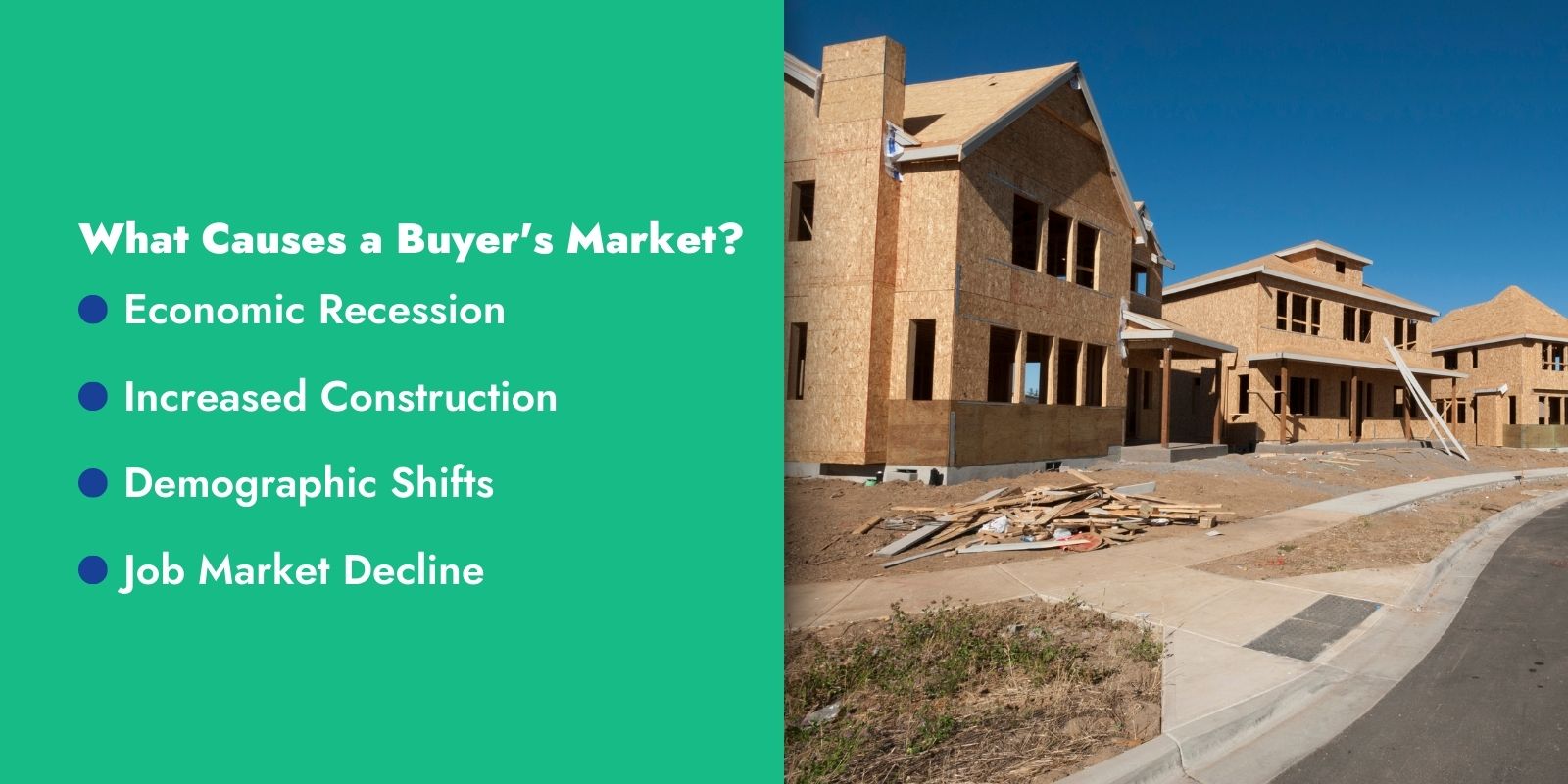The world of real estate can be a complex and ever-changing landscape, with shifts in supply and demand often dictating the lay of the land.
Whether you’re a buyer or a seller, these fluctuations can create a “buyer’s market” or “seller’s market”, with one party holding the upper hand in negotiations.
While national trends can impact these markets on a larger scale, it’s often the regional and local trends that truly make a difference.
These shifts may reflect changes in demand for certain neighborhoods, school districts, or even generational shifts.
It’s important to know the difference between a buyer’s market and seller’s market if you are considering buying or selling a home.
Understanding the two different types of markets can give you a strategic advantage when it comes to getting the best deal possible in either situation.
In this article, we’ll look at what those terms mean, how each type of market affects buyers and sellers, and useful tips for navigating these different scenarios with success.
Read on to gain clarity on one of the most vital concepts spoken about in real estate!

What is a Buyer’s Market?
A buyer’s market happens when there are more homes available for sale than there are buyers looking to purchase.
This means that the supply overshadows demand, making it a great time for those looking to buy a property.
The term “buyer’s market” is commonly used in real estate but it can apply to any market with greater inventory than customers.
One of the biggest indications of a buyer’s market is lower home prices.
During this time, homes often sell for the listing price or even less.
So, if you’re in the market for a new home, keep an eye out for those lower prices and jump on them when you can!
Sellers are at a disadvantage because of the volume of competition.
Instead of waiting for the right buyer to come along, many sellers end up settling for a lower price than they initially hoped, simply because they’re eager to make a sale.
If you’ve noticed “For Sale” signs lingering in your neighborhood longer than usual, it’s a sign that it’s currently a buyer’s market.
In this environment, bidding wars are rare, and buyers are less likely to exceed the asking price when so many options are available to them.
Don’t give up hope, though!
With patience and a little strategy, you can still achieve the sale you’re hoping for.

What Causes a Buyer’s Market?
A buyer’s market occurs when favorable changes in the housing market give buyers an edge over sellers.
This means that conditions like decreased buyer urgency and increased seller eagerness to sell are making it easier to find a great deal on your dream home.
Some common reasons why this might happen include:
- Economic Recession: An economic recession happens when an area experiences a prolonged decline in economic activity. Such a downturn can cause a ripple effect on various aspects, including the real estate market. For instance, if homeowners find themselves unable to keep paying their mortgages, they may have no choice but to sell their houses. This, in turn, can increase the housing inventory while reducing the buyer pool, contributing to the overall economic decline.
- Increased Construction: A large increase in the number of new homes being built in an area often results in buyer’s markets. The fact that new homes are being built doesn’t mean that there will be enough interested buyers. Overdevelopment of new real estate in an area often results in surplus of housing supply.
- Demographic Shifts: The way different demographics approach the local real estate market can have a significant impact on supply and demand. For example, when millennials or gen-z decide to postpone homeownership, it causes the buyer pool to shrink.
- Job Market Decline: A dwindling job market may prompt homeowners to sell their houses and move to different locations with more job opportunities, creating a buyer’s market.
A recent example of an economic recession creating a buyer’s market was the financial crisis of 2007-2008.
Unsustainable mortgage rates caused many homes to go into foreclosure.
This resulted in significant price drops from homeowners desperate to sell.
The increase in supply was dramatic, but there were little to no buyers interested in purchasing properties.

Tips for Buying in a Buyer’s Market
For those on the hunt for a new property, a buyer’s market is the time to pounce!
With a buyer’s market in full swing, you have the upper hand and can use a variety of strategies to ensure you snag an amazing deal.
Take advantage of this unique opportunity to get the most bang for your buck and find the perfect real estate investment for you.
Take Your Time & Avoid Rushing
As a buyer in a buyer’s market, you hold a considerable amount of power.
This unique position allows you to take your time and explore your options without having to worry about losing out on a property you have your eye on.
With low demand for houses, there is no competition, so there’s less of a risk that you’ll miss out on a house you really want.
Weigh Your Options
Buying a home in a buyer’s market affords you the luxury of being able to explore your options without feeling pressured or rushed.
With time on your side in a buyer’s market, it’s a good idea to see as many homes for sale as you can.
This gives you more opportunities to find your dream home.
It can also help give you the market knowledge you need to confidently make a decision about what and when you want to buy.
With low demand for properties, bidding wars and competition are unlikely, giving you the freedom and confidence to proceed at your own pace.
Knowing what’s on the local real estate market ensures that you find your ideal fit and gives you a greater ability to negotiate based on competing list prices.
Pay Attention to Days on Market
When the real estate market is in favor of buyers, you have more bargaining power.
This is especially true for homes that have been lingering on the market for a while.
The longer a house sits unsold, the more willing the seller will likely be to negotiate on the price.
So if you’re in the market for a new home, keep an eye out for properties that have been listed for a while – you might be able to snag a great deal.
Negotiate With Confidence
When you’re in the market to buy a house, negotiating the sale price can be one of the most nerve-wracking parts of the process.
One key question to ask is how long the house has been languishing on the market.
The longer it’s been for sale, the more motivated the owner may be to accept your offer.
This can put you in a prime position to ask for added perks, like a lower price, a home warranty, or assistance with closing costs.
Don’t know what to ask for?
That’s where your real estate agent comes in.
They can guide you through the negotiation process and help you get the best deal possible.

Tips for Selling in a Buyer’s Market
As a seller in a buyer’s market, you may have to be a bit more strategic and flexible in your sales plan.
That does not mean you have to submit to a buyer’s every whim.
Below we’ve outlined a few tips for selling in a buyer’s market:
Price Competitively
Selling your home in a buyer’s market means that it’s essential that your house is priced similarly or lower than comparable homes in the area.
With buyer’s holding all the power in this market, they won’t think twice about bypassing your property if it’s priced too high.
Be Open to Negotiation
If you want to sell your house in a buyer’s market, it’s essential that you be flexible and open to negotiation.
Closing a deal on your house is a lot easier when you’re open to negotiating and are prepared to compromise with buyers.
This might include things like covering the closing costs or including concessions to close the deal.
Make Repairs
With so many options to choose from, buyers are generally more picky with their options, which means you need to be all the more prepared.
Making improvements and upgrades to your home can separate it from others on the market.
Whether it’s a small, cosmetic fix or a larger issue, do your best to address anything buyers might bring up during the negotiation process.
We strongly recommend hiring someone to conduct a pre-inspection of your house.
This will enable you to identify and fix any problems or make necessary repairs prior to listing your property.

What is a Seller’s Market?
A seller’s market refers to a real estate market where demand for homes outweighs the available supply.
In other words, there are more interested buyers than there are homes up for sale.
While a seller’s market may be frustrating for buyers, it’s excellent news for anyone looking to sell their home.
Homes tend to sell faster in these conditions, and sellers can often raise their asking prices due to increased demand.
Buyers are also more likely to accept properties as-is and may not have the power to negotiate prices.
However, the high demand often leads to bidding wars between buyers, resulting in multiple offers and continually increasing prices.
So, if you’re on the hunt for a new home in a seller’s market, prepare yourself for potential competition and possibly having to offer more than the initial asking price.
This type of market leads to bidding wars, where buyers fight tooth and nail to secure their dream home.
So if you’re a seller in a seller’s market, good news – you hold all the power.
But if you’re a buyer, be prepared to put up a fight and fork over some extra cash.

What Causes a Seller’s Market?
Like a buyer’s market, there are numerous factors that can cause the real estate market to fluctuate in favor of the seller.
Some of the primary contributors to a seller’s market include:
- Low-Interest Rates: The affordability of mortgages has a direct impact on the home-buying decision for many people. As interest rates dip lower, prospective buyers become more motivated and encouraged to invest in property. Furthermore, when there is a limited inventory of homes available for sale, competition among bidders arises, causing a surge in willingness to pay more than the asking price. Consequently, the trend of low-interest rates stimulates the housing market positively.
- Job Market Growth: A surge in job market growth sparks an influx of job seekers to thriving local communities. Naturally, the rise in demand for work brings about a higher need for real estate, as these individuals seek to put down roots and establish themselves in these promising areas.
- Population Growth: As with growing job markets, population increases also increase the demand for housing. If few properties are available during this population growth, the demand can quickly exceed the supply, giving sellers the upper hand.
- Development Limits: Local governments can implement limits on new developments that restrict how many new houses can be built in an area, resulting in a lower housing supply.
- Decreased Home Construction: Even without limitations placed on development by local governments, a shortage of new home construction can result in decreased real estate inventory.
The COVID-19 pandemic housing market has created an ongoing seller’s market, with a huge demand for homes fueled by government stimulus checks, historically low-interest rates, and the freedom to work remotely.
Unfortunately for buyers, uncertainty caused by the pandemic also made many sellers sit tight, limiting the supply of houses available for sale.

Tips for Buying in a Seller’s Market
In a crowded market with fewer homes to choose from, buyers have to be on top of their game to secure the home of their dreams.
Even if you’re prepared to pay the asking price or more, you could still end up in a bidding war that sends the price soaring.
Waiting for a buyer’s market can be tempting, but sometimes timing isn’t on your side.
To thrive in a competitive market, act fast and be ready to make an offer that stands out from the rest.
If you’re looking to buy in a seller’s market, don’t lose hope – just keep these tips in mind.
Get A Mortgage Pre-Approval
Regardless of the housing market you’re in, one of the most important steps to take is getting a mortgage pre-approval.
Having a mortgage pre-approval can help you stand out among other buyers.
This will indicate to sellers that you’re serious and show them that you’re financially able to follow through with your offers.
Move Quickly
In a market where sellers hold the cards, time is of the essence.
When hunting for a home in a seller’s market, hesitation can be the pitfall that leads to missing out on your dream home.
Once you’ve found the perfect home, don’t hesitate – act quickly or risk losing it to another buyer.
Procrastination could result in disappointment as you watch your dream home get snatched up by someone else before you even have a chance to put in an offer.
Don’t let your dream home slip through your fingers by waiting too long.
Once the opportunity presents itself, act swiftly and confidently to avoid missing out.
Prepare for Bidding Wars
If you’re on the market for a new home, it’s important to keep in mind that competition is fierce.
You might find yourself in a bidding war with other interested buyers.
It’s crucial to establish a budget and determine the maximum amount you’re willing to spend before making an offer.
Make sure to consider your financial situation carefully to avoid over-extending yourself.
By doing so, you’ll be better prepared to make a confident and informed bid on the home of your dreams.
Don’t Push the Envelope
As a buyer in a seller’s market, it’s important to be strategic with your offers.
In this competitive environment, you don’t want to risk losing out on a dream property by making demands that may give the seller reason to turn to other interested parties.
To increase your chances of securing your desired property, it’s wise to simplify your offer and limit any contingencies, concessions, or repair requests.
By keeping things straightforward, you’ll increase your appeal to sellers and boost your likelihood of coming out on top in this competitive market.
Maintain Your Standards
While sellers may hold the upper hand in a seller’s market, you shouldn’t sacrifice your standards for affordability.
A home is not just a space, it’s a substantial investment, and making a hasty decision could result in long-term regret.
Don’t settle for anything less than what you love, even if it means taking your time to weigh your options carefully.
Remember, it’s not just about finding a house, it’s about finding a home that brings joy to your life for years to come.

Tips for Selling in a Seller’s Market
Home sellers are in the driver’s seat during a seller’s market.
But that doesn’t mean you should become complacent with your home sale.
You’ll want to provide value to attract the right type of buyers.
Even though you may not need a strong strategy to sell, there are still things you can do to generate the best possible outcome:
Prepare Your Home
With a property on the market, it’s essential to make a great first impression.
Ensuring that your home is clean and organized is a great way to captivate potential buyers and boost the appeal of your property.
Keep in mind that small details can make a big difference, and a tidy home may even inspire more competitive offers.
So before you open your doors to potential buyers, take some time to prepare your home for sale and show off your property in the best light possible.
Know Your Home’s Value
In a market where sellers have the upper hand, it may seem tempting to maximize your profit and set a sky-high price for your property.
However, taking a more grounded approach can actually benefit you in the long run.
By setting a fair market value price for your home, you may end up drawing in more potential buyers than those who list their properties at unreasonably high prices.
So don’t be afraid to make a smart move and price your home fairly – it could end up being a win-win situation for both you and your buyers.
Consider Offers & Confirm Pre-Approval
When selling your property, it’s important to remember that the highest offer may not necessarily be the best one.
It’s tempting to jump at the sight of a high offer for your property, but don’t let dollar signs cloud your judgment.
Not all buyers can meet their initial offer, and it’s important to ensure they have the financial means before giving the green light.
Before accepting an offer, make sure to assess the buyer’s financial situation to ensure they can afford the price they’re offering.
One reliable method for verifying a buyer’s financial qualifications is to see if they’ve been pre-approved for a loan.
This way, you can rest easy knowing that you’re selling to a financially secure buyer.
Protect yourself and your property by taking the extra steps to ensure the buyer can follow through.

What’s the Difference Between a Buyer’s vs. Seller’s Market?
Buyer’s vs. seller’s markets are a matter of supply and demand.
At its base, the housing market is relatively simple to understand, but there’s more that goes into it than these basic definitions.
There are three primary differences between a buyer’s vs. seller’s market.
Buyer Expectations
When it comes to buying a home, the expectations of buyers can vary greatly depending on the current state of the market.
In a buyer’s market, individuals want to be spoiled for choice and find amazing deals that meet their needs.
On the other hand, in a seller’s market, buyers tend to anticipate a more cut-throat environment where prices run high and competition is fierce.
However, those in the market for pricier homes have higher standards and expect their purchases to reflect their investment.
Often preferring properties that are move-in-ready and premium in quality, sellers must ensure their houses are top-notch to justify their premium prices.
Power Dynamic
In the world of real estate, the game of power shifts between two key players: the buyer and the seller.
As the market fluctuates, so too does the advantage.
In a buyer’s market, potential homebuyers hold more sway.
More homes are available, and prices are lower, making it easier for buyers to negotiate and ultimately choose the best fit.
Conversely, in a seller’s market, the ball is in the sellers’ court.
Demand is high and supply is low, allowing sellers to ask for top dollar and even spur competitive bidding wars.
So whether you’re looking to buy or sell, understanding market dynamics is crucial for making savvy decisions.
Marketing Strategies
When it comes to selling a home, the game changes depending on whether it’s a buyer’s market or a seller’s market.
In a buyer’s market, sellers need to work harder to make their properties stand out.
This can include utilizing social media, hosting open houses, and crafting compelling advertisements.
However, in a seller’s market, sellers have a bit more breathing room.
While marketing strategies are still important, it’s more about showcasing the property’s best features through professional photography, intentional staging, and fair pricing.
Regardless of the market, a thoughtful and tailored marketing plan is crucial to achieving a successful sale.

Wrapping Up Our Comparison of Buyer’s vs. Seller’s Markets
Whether a buyer’s market or seller’s market, there are many steps and tips to take into consideration.
A buyer’s market occurs when the number of properties for sale exceeds the number of buyers.
Commonly, it is caused by economic factors such as recession, economic growth or shifts in job opportunities.
It can be characterized by falling home prices and a long period of time on the market.
It is important to do your homework in researching neighborhood trends and housing prices in order to get a good deal.
On the other hand, a seller’s market generally has higher selling price due to low inventory and lots of competition from many potential buyers.
It is beneficial to have made any necessary repairs and updates before listing your property in order to ensure that you will receive a profitable offer.
Knowing and understanding features of both markets no matter if you are buying or selling a home is essential.
This knowledge can potentially help you secure a better purchase agreement or deal with one less stressor when selling your property.
If you need further advice or guidance with buying or selling a property in either market then talk with an experienced real estate agent.
Finding a real estate agent to trust and rely on when buying or selling your home is essential.
With that in mind, why not turn to the tried-and-true experts at Helen Painter Group Realtors?
A classic Fort Worth real estate agency, we’ve been serving buyers and sellers since 1958.
With over six decades of success behind us, you’ll surely have peace of mind knowing your best interests are being represented each step toward buying or selling a home.

